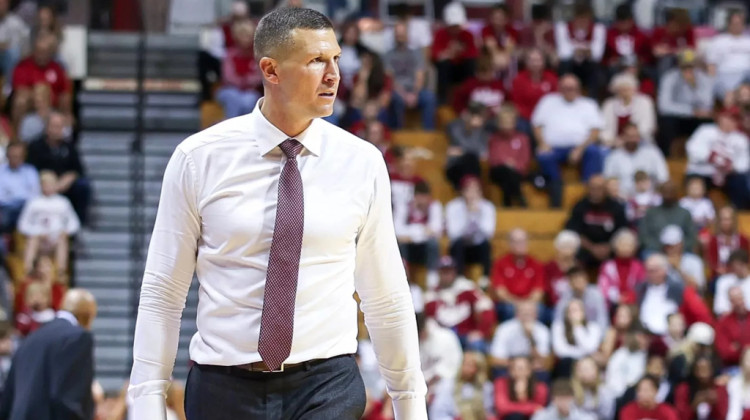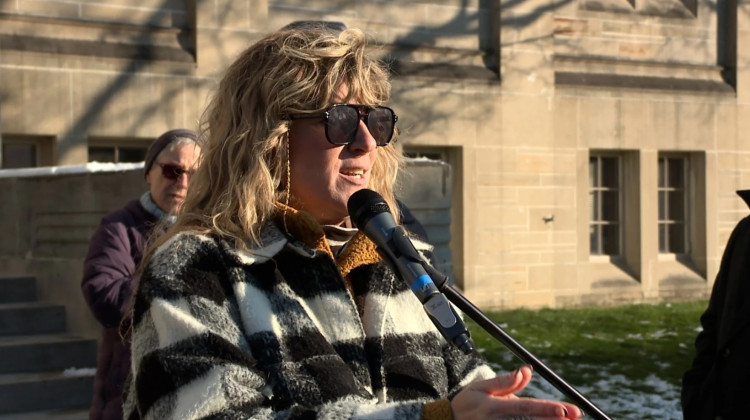The Indianapolis Public Schools board of commissioners delayed its planned Saturday vote on putting a $413.6 million operating property tax referendum on the May primary ballot. The referendum would support the district’s controversial Rebuilding Stronger plan.
The delay came after months of pushback from charter school advocates and longtime collaborators, including the Indy Chamber, which announced its opposition Friday. Many argue the plan should also give equal per pupil funding to the district’s innovation charter partners and the city’s independent charter schools.
IPS Superintendent Aleesia Johnson read a statement to a packed room at the start of the meeting. She said the opposition to the referendum and to the Rebuilding Stronger plan concerns her.
“I have to believe that we all want for other people’s children what we want for our own, and I’m left to wonder why, time and time again, IPS is asked to wait on behalf of its students, to be more creative with its already strained resources, to figure out another way,” Johnson said.
The board already added a $410 million capital referendum to the primary ballot for building renovations at more than two dozen facilities and construction for a new elementary building. Now the future of the operating referendum remains in limbo. Without it, it’s unclear if the district will be able to close six schools and consolidate resources to make more learning models – including the international baccalaureate curriculum – available to more students.
The meeting took place during the board’s winter retreat at the Madam Walker Legacy Center. Ahead of the meeting, dozens of community members stood outside the building holding signs that demanded an equal share of funds.
Public comment at the meeting lasted around two hours. More than 50 children, parents and education advocates attended to speak out both for and against the plan.
The Board of Commissioners have not been unified in support of the plan. Commissioners Nicole Carey, Angelia Moore and Hope Hampton — elected in November — have been either against or indecisive about it. Meanwhile, longtime commissioner Diane Arnold supports it and said the opposition surprised her.
“I'm not sure why those same innovation partners are willing to sacrifice much needed and equitable funds to support their own students and teachers,” Arnold said.
The operating referendum would inject $39 million to boost teacher and staff pay and $12.6 million to fund part of the district overhaul plan. The board has until Feb.17 to vote on whether to add the operating referendum to the Marion County ballot, according to state code. But after the meeting, President Venita Moore said she “doubt[s] very seriously” that the board will vote on the referendum before the deadline.
Why voters, community groups disapproved another referendum
In the past two months, innovation and independent charter operators and advocates have demanded an equal share of the potential referendum funds. Without the extra support, they say students who attend non-traditional city schools would face a widening racial and socioeconomic equity gap. The district administrators had already delayed a vote to approve the ballot measure as they made adjustments to attract more support.
Indianapolis parent Susan Sargeant was one of many parents who said in public comment Saturday that more adjustments are needed to get that support. She gave this statement to the board on behalf of Tiffany Barnett.
“We understand that this is bigger than you guys. We know that the funding should come from a higher level, but here we are.” Sargeant said, “We are sorry that you're in this position, but we're in it with you. The money right now is going to IPS. We need some of that funding for our charter schools.”
Advocacy groups — such as EmpowerED Families and RISE Indy — argue all schools should get equal per pupil money because they all serve local students of color, which have some of the lowest academic performance scores in the state.
Tommy Reddicks, CEO of Paramount Schools of Excellence – one of the highest performing schools in the state – said charter supporters would make sure voters didn’t approve the referendum.
“Paramount and its traditional charter allies with a 31 percent share of the sector will organize and oppose this capital and operational referendum with thousands upon thousands of voters,” Reddicks said. “Our voter turnout rate will be extraordinary. This organizational effort will be easy because our thousands of parents know that this tax increase earmarked for education is not going to support their children.”
Some of the district’s longtime collaborators agree the Rebuilding Stronger funding plan is not equitable, including Stand For Children Indiana and The Mind Trust. The local education reform group -- who developed charter school partnerships with IPS and the city -- praised the delay.
“This pause will allow for additional time to build a coalition that supports fair funding for all public school students within IPS boundaries,” CEO of The Mind Trust Brandon Brown said in a statement. “The Mind Trust is proud to be a long-time partner with IPS, and we stand ready to support the district in developing a solution that can win broad community support.”
In the past, IPS partnered with the Indy Chamber to receive support from the business community for its 2018 referendums. The district agreed to work with the chamber for three years to dramatically cut its budget by 2026. But Friday, the business community released a public statement asking the district to tap the breaks on its 2023 operating referendum.
“Other revenue and efficiencies alternatives must be explored, such as utilizing remaining federal relief funding, creative facilities reuse, and accounting for surplus revenues from the existing 2018 referenda,” the Indy Chamber statement read. “How can these alternatives be leveraged to reduce the need for an additional property tax increase and perhaps extend the timeline for raising new revenues?”
The chamber’s statement also questions how IPS will be held accountable for addressing student performance through the Rebuilding Stronger plan, whether the district is adequately utilizing funds and why the property tax referendums won’t be shared equally with innovation charter schools.
How we got here
Operating referendum funds allow innovation charters to pay for various student supports, such as learning interventionists. Innovation and independent charter schools do not directly receive referendum or other property-tax revenue unless a school district agrees to share it, according to state law. Lawmakers have filed multiple bills in the legislative session to change that, but to date none have passed.
In November 2021, IPS agreed to share a portion of its 2018 operation referendum funds with 25 innovation charter schools that partner with the district. Schools receive $500 per in-district resident student, or roughly $27.5 million for the remainder of the referendum over the next four years. But that’s significantly less than the $1,800 traditional, in-district IPS students receive.
When IPS announced the proposed referendum – to partially support the Rebuilding Stronger plan – in October, the spending plan provided innovation charter schools with $650 for each student who lives in the district boundary. Meanwhile, funding for IPS-run schools would increase by around $2,300, and independent charter schools not in partnership with the district would receive nothing.
If IPS puts the referendum on the Marion County Primary Election ballot, and if voters approve it, it would provide roughly $1,000 of per pupil funding to innovation charter operators.
Despite community push back, Johnson refused to share referendum revenue with charter schools not already partnering with the district.
IPS would use the referendum funds for teacher pay, additional student supports and to support innovation charter partnerships, according to the district. Starting pay for IPS teachers this year is $50,400, the high among Marion County’s public charter schools.
What do the capital and operating referendums mean for tax payers?
If approved, the operating property tax levy would switch from $0.19 to no more than $0.25 per $100 of assessed value on Jan. 1, 2024. It would generate $413.6 million, or $51.7 million annually over eight years, and add $2.60 per month in property taxes to homeowners of a median-valued property.
It would also replace a current $220 million property-tax referendum approved by voters in 2018.
The bulk of the revenue would go toward teacher pay. Last year, the district provided teachers with a 3 percent pay increase.
Indiana property taxes are capped at assessed value rates based on the type of property: 1 percent for owner-occupied homes; 2 percent for other residential properties and farmland; and 3 percent for all other property. But if voters approve a local referendum, a property tax bill can exceed the cap and the extra taxes go to the local school district.
In December, the board approved the district to place a $410 million capital referendum on the May 2 primary ballot to pay for construction at more than two dozen other facilities. Fifteen of 67 IPS school buildings are in poor or worse condition, according to district documents.
If approved, the local property tax levy for the capitol referendum – that IPS did vote to put on the ballot – would be no more than $0.2066 per $100 of assessed value. It would add $3.18 per month in property taxes to homeowners of a median-valued property.
The funds would cover the cost of a new $34.6 million elementary facility for Joyce Kilmer School 69 and improvements at around 20 schools – including $66.4 million at Arlington Community Middle School for building and athletic upgrades, and $39.6 million at the former Thomas Carr Howe building to prepare it to reopen as a middle school.
Contact WFYI education reporter Elizabeth Gabriel at egabriel@wfyi.org. Follow on Twitter: @_elizabethgabs.
 DONATE
DONATE







 Support WFYI. We can't do it without you.
Support WFYI. We can't do it without you.